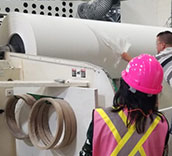

 Process Debottlenecking and Optimization Approach to Maximize Operational & Utilization Efficiency of Pulp and Paper Processes
Process Debottlenecking and Optimization Approach to Maximize Operational & Utilization Efficiency of Pulp and Paper Processes
- Organized by Natural Resources Canada, FPInnovations and PAPTAC
- Organisé par Ressources Naturelles Canada, FPInnovations et PAPTAC
When/ Quand:
September 16, 2021
14:00 – 15:00 ET
Speakers:
Enrique Mateos Espejel,
FPInnovations
Click here to register Click here to register
ABOUT THE WEBINAR SERIES
The Pulp and Paper Technical Association of Canada (PAPTAC), in collaboration with the Natural Resources Canada (NRCan) and FPInnovations will be hosting a series of webinar on opportunities for advanced manufacturing in Canada’s forest sector. The purpose of the webinar is to share knowledge on emerging or commercially available technologies with industry and demonstrate how they can be implemented.
The onset of the COVID-19 pandemic resulted in unprecedented economic turbulence and lower demand for almost all forest products, as well as increased operating costs in order to ensure health and safety of workers. More importantly, COVID-19 compounds existing challenges including declining timber supply due to wildfires and pests, trade disputes with the U.S., and declining demand for printing and writing paper products.
NRCan, FPInnovations and PAPTAC actively support the forest sector transformation and view advanced manufacturing as a key strategy to make the sector more competitive and resilient. While great strides were made over the past decades on energy efficiency and the use of renewable energy in the forest sector, NRCan, FPInnovations and PAPTAC are fully committed to build on that momentum and provide industry the tools required to realize the full potential of the circular bioeconomy.
ABSTRACT
Process debottlenecking has become essential to the pulp and paper (P&P) industry in Canada to maximize mill assets utilization and to facilitate the integration of new technologies as they transition to become biorefineries. Pulping processes are deeply interconnected with many interactions between the main process departments, water systems, and steam systems. Therefore, a process integration perspective is required to analyze the process interactions, and the maximum potential of operational improvement to develop solutions’ roadmaps. These roadmaps consider low-cost options in the short-term to improve process operation efficiency while considering the medium/long-term perspective to debottleneck the process.
A systematic approach has been developed to identify, quantify, and classify process bottlenecks and operational inefficiencies at the departmental and mill-wide levels. The proposed debottlenecking approach focuses on increasing the capacity of a process while improving its overall performance. The approach consists of four steps. First, mill management should establish improvement targets (e.g., pulp production increase targets, operating cost reduction, energy reduction, biorefinery integration, etc.) to guide the debottlenecking process. Then, bottlenecks are identified, screened, and ranked. Screening and ranking are done based on the existing bottlenecks and inefficiencies of each department/process based on the established targets. The next step is process diagnosis which uses multivariate data analysis, process simulation, unit operations best practices, and root-cause analysis to identify the interactions between different process bottlenecks and operation. In the last step, the improvement solutions are established and a roadmap of measures is proposed to reach the desired targets.
The proposed approach has been successfully applied in several Canadian mills. For one of the mills operational projects and projects with low/medium capital expense (capex) would result in up to 6% pulp production increase with EBITDA potential >1M$/year. Energy reduction projects with non-capital required were also identified and saved the mill 0.3- 0.5 M$/y.
Enrique Mateos Espejel currently holds the position of Senior Scientist in the Thermal Process group of FPInnovations. He has expertise in energy efficiency, process integration, data analysis, process debottlenecking and process simulation. He holds a B.Eng. and a M.Eng. in Chemical Engineering from the Universidad de las Americas Puebla (Mexico), a Ph.D. in chemical Engineering from École Polytechnique de Montréal and an MBA from John Molson School of Business. He joined FPInnovations in 2010 and has worked in the development of holistic methodologies to improve the energy efficiency of P&P processes while considering energy, water and techno-economic aspects. As part of his work with FPInnovations, he has participated in numerous energy efficiency optimization studies to help mill reduce energy and water consumption and greenhouse gases emissions.


